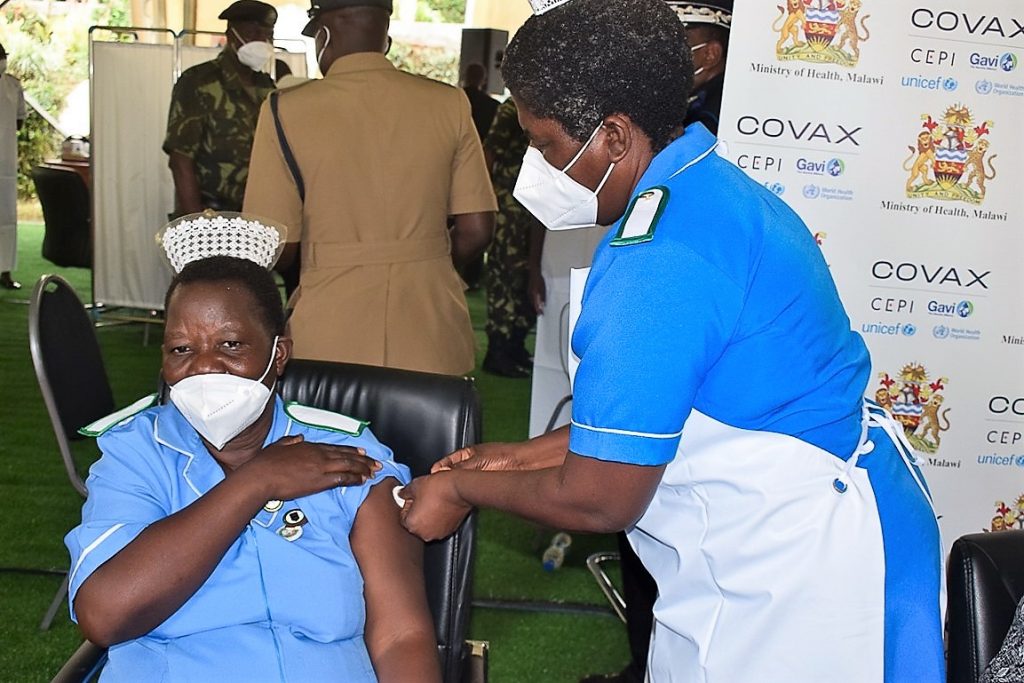CSOs push govt on Covid-19 vaccines
Pressure continues to pile on the Malawi Government to procure Covid-19 vaccines with civil society organisations (CSOs) demanding equity in vaccinating citizens to ensure that everyone is protected from effects of the pandemic.
In a petition delivered to the Malawi Government through the Parliamentary Committee on Health at Parliament Building in Lilongwe yesterday, the CSOs, led by Aids Healthcare Foundation (AHF), asked legislators to allocate a supplementary budget of at least $40 million (about K32 billion) to procure Covid-19 vaccines targeting about five million people to complement donations.

Besides purchase of drugs, AHF country programme manager Triza Hara also asked government to address the inequalities existing between the rural and urban areas in the country in vaccine administration and information dissemination.
She said: “In some areas, citizens have not received adequate information about the benefits of taking the Covid-19 vaccines and in other areas, even the availability of the vaccine is not adequate.
“So, our request to government is to take the word further into the rural areas.”
Concurring with Hara, health rights activist Maziko Matemba said people in rural areas need to be reached with adequate information on the vaccine and its benefits.
He said: “People in the rural areas need to be aware of the vaccine and its benefits for them to take it voluntarily and from an informed point of view. We appeal to government for more awareness in rural communities. Traditional and religious leaders, among others, were trained and they need to be agents of information.”
On his part, Malawi Health Equity Network executive director George Jobe stressed that universal health coverage should be considered, arguing that both the rich and the poor need to have access to the vaccines and stay protected.
He said the CSOs arrived at the five million figure to supplement the 3.8 people that the Covax Facility committed to supply doses for.
Jobe said: “We feel that five million people is manageable and as a country we can make that commitment towards saving Malawians. We are also considering that in case there will be no other donor commitments, this is a reasonable supplement to the figure that Covax Facility will provide.”
The petition has come one week after health experts, in separate interviews with The Nation, pleaded with government to consider budgeting for procurement of Covid-19 vaccines, saying depending on ‘begging’ and waiting for donations is not a sustainable way to protect the population from the pandemic.
Their concern came against a background of the country running low on the initial 512 000 jabs.
Currently, Malawi is banking on the yet-to-be-delivered 900 000 doses from the Covax Facility, a multi-donor initiative that mobilised the vaccines for poor countries. Delivery was due in May, but delayed due to high demand for the vaccine and India’s decision to reduce exports of the same to cater for its domestic needs.
In a statement on June 17, Ministry of Health Principal Secretary Dr. Charles Mwansambo confirmed that the country is experiencing stockouts of the vaccine due to delays in arrival of the next consignment from the Covax Facility.
Reacting to the vaccine stockouts that forced some urban dwellers to access the jab in rural areas where there was low demand, President Lazarus Chakwera last Thursday said Malawi is at the mercy of the international community on the availability of Covid-19 vaccines.
Briefing journalists at Kamuzu International Airport in Lilongwe on his return from a Southern African Development Community (Sadc) Extraordinary Heads of State and Government Summit in Maputo, Mozambique, the President said his administration may resort to using emergency funds to procure the doses.
Chakwera said: “You may not see any funds for Covid-19 vaccination [in the budget], but we have the unforeseen expenditure vote. We will use it plus the World Bank gave us $30 million [about K24.1 billion], we will get some vaccines.
“Even outside Covid-19, we have always relied on international community for help with immunisation of various diseases, so it’s not something strange for us to admit that we are at the mercy of the international community.”
On where the vaccine will be sourced from, Extended Programme on Immunisation programme manager Mike Chisema yesterday indicated that if the funds were provided, Malawi could either use self-financing, the Covax Facility or the Africa Vaccine Acquisition Task Team to procure the doses currently in short supply globally.
He said: “We will weigh the options; looking at the amount of money, the number of doses and how much has been bargained, for a better deal.”
The petition the CSOs presented is part of AHF’s global call to action called Vaccinate Our World to urge world leaders, vaccine manufacturers and public health organisations to provide equal access to Covid-19 vaccines worldwide, especially in low-income countries such as Malawi.
Since the Covid-19 inoculation exercise began on March 11 2021, 428 407 doses of the Oxford-AstraZeneca vaccine have been administered in the country, representing about 2.6 percent of the total population. To achieve herd immunity, medical experts recommend 60 percent coverage of the population.
Out of those, 385 242 have received the first dose against 43 165 for the second dose.
Parliamentary Committee on Health member Chimwemwe Chipungu, who received the petition, said the issues raised will be handled with the urgency they deserve.
Malawi targets to vaccinate 11 million or 60 percent of the population with the Covax Facility providing vaccines for 3.8 million people. Government said it would mobilise seven million doses to hit at least 11 million of the population.
Malawi reported its first three Covid-19 cases on April 2 2020, barely a fortnight after the World Health Organisation had declared Covid-19 a global pandemic. It has so far recorded 35 219 cases, including 1 178 deaths.





